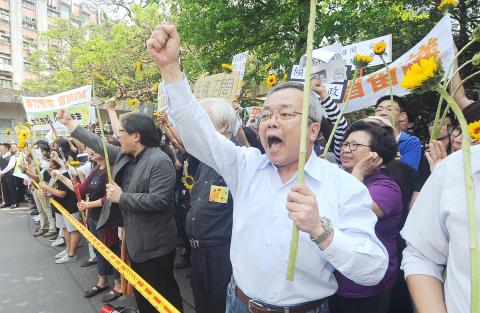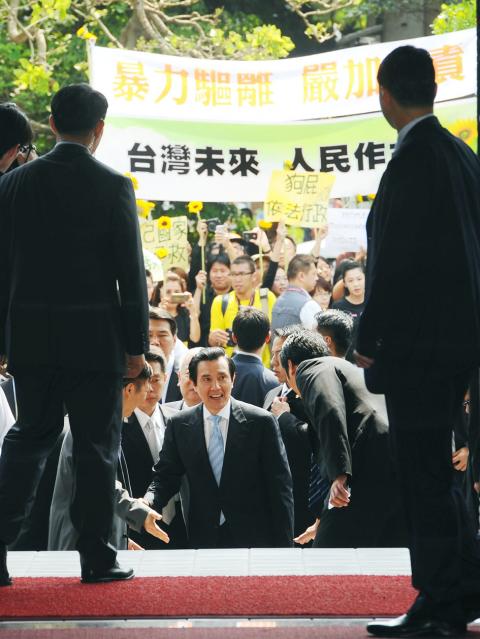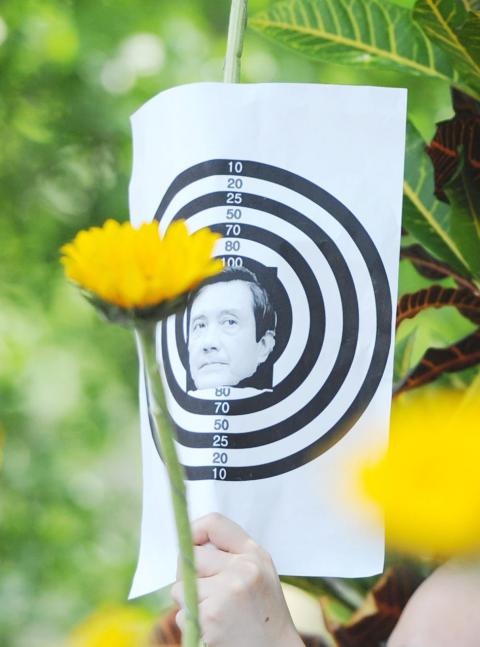Several hundred researchers at the Academia Sinica shouted appeals first made by the Sunflower movement at President Ma Ying-jeou (馬英九) yesterday when he visited the nation’s most eminent national research institution for an international conference about the Diaoyutai Islands (釣魚台) issue.
While Ma was giving the keynote speech at the conference, Chen Yi-shen (陳儀深) and Shiu Wen-tang (許文堂), associate research fellows at the college’s Institute of Modern History, and Paul Jobin, an associate professor at the University of Paris Diderot, silently held aloft posters with messages for the president.
The posters read: “Taiwan’s future, the people decide (台灣未來, 人民作主),” and “Cross-strait agreements, legislative oversight (兩岸協議, 立法監督).”

Photo: Liao Chen-huei, Taipei Times
“It is a good occasion to have the president look at what people have to say because apparently he did not listen to them at all” during the Sunflower movement, regardless of his recent pledge to reform the Chinese Nationalist Party (KMT), Shiu said by telephone last night.
Jobin said he attended the conference because he was interested in the topic and hoped to listen to exchanges of views between Ma and academics from Japan, China and Hong Kong.
“The reason I joined with my colleagues who prepared the banners was that I feel concerned for young people. They are so brave and committed to democracy in Taiwan, but were disregarded and treated badly by the government, which is trying to indict them,” Jobin said to the Taipei Times by telephone.

Photo: Chang Chia-ming, Taipei Times
He added: “I feel like we are going back to the nation’s bad times and I am concerned about the things that are going on in Taiwan.”
Jobin said he totally agreed with Ma’s reaction when former Japanese prime minister Yoshihiko Noda said to the UN in September 2012 that “there exists no issue of territorial sovereignty” over the Senkaku Islands, as the Diaoyutai Islands are named in Japan.
“President Ma said that: ‘Unless the relevant parties recognize that the dispute does exist, a resolution cannot possibly be reached.’ That is a very nice way of thinking. However, for the service trade agreement with China, he does not recognize there is a dispute. I hope he can act in accordance with his words,” Jobin said.

Photo: CNA
Jobin said that he was disappointed to see Ma leave after his speech without speaking with participants at the conference.
“I know he is a very busy man, but he could have stayed for five or 10 minutes. I think this is an indication of the way he understands democracy: He speaks a lot himself, but he does not listen to others.”
Kevin Chang (張谷銘), an associate research fellow at the Institute of History and Philology, said that there were 300 to 400 researchers, staff and students at a protest targeting Ma when he arrived at the Academia Sinica.
“It’s the first time in the country’s history that the Academia Sinica has assembled in a rally against a president,” Chang said.
They were led by sociologist Chiu Hei-yuan (瞿海源) and held sunflowers and banners while chanting slogans, including: “Restore constitutionalism, defend democracy (重建憲政, 捍衛民主).”
At one point after Ma had arrived, Chiu shouted at the police, who were trying to ward off the protesters and media: “This is the Academia Sinica, not the investigative bureau.”

SECURITY: As China is ‘reshaping’ Hong Kong’s population, Taiwan must raise the eligibility threshold for applications from Hong Kongers, Chiu Chui-cheng said When Hong Kong and Macau citizens apply for residency in Taiwan, it would be under a new category that includes a “national security observation period,” Mainland Affairs Council (MAC) Minister Chiu Chui-cheng (邱垂正) said yesterday. President William Lai (賴清德) on March 13 announced 17 strategies to counter China’s aggression toward Taiwan, including incorporating national security considerations into the review process for residency applications from Hong Kong and Macau citizens. The situation in Hong Kong is constantly changing, Chiu said to media yesterday on the sidelines of the Taipei Technology Run hosted by the Taipei Neihu Technology Park Development Association. With

CARROT AND STICK: While unrelenting in its military threats, China attracted nearly 40,000 Taiwanese to over 400 business events last year Nearly 40,000 Taiwanese last year joined industry events in China, such as conferences and trade fairs, supported by the Chinese government, a study showed yesterday, as Beijing ramps up a charm offensive toward Taipei alongside military pressure. China has long taken a carrot-and-stick approach to Taiwan, threatening it with the prospect of military action while reaching out to those it believes are amenable to Beijing’s point of view. Taiwanese security officials are wary of what they see as Beijing’s influence campaigns to sway public opinion after Taipei and Beijing gradually resumed travel links halted by the COVID-19 pandemic, but the scale of

A US Marine Corps regiment equipped with Naval Strike Missiles (NSM) is set to participate in the upcoming Balikatan 25 exercise in the Luzon Strait, marking the system’s first-ever deployment in the Philippines. US and Philippine officials have separately confirmed that the Navy Marine Expeditionary Ship Interdiction System (NMESIS) — the mobile launch platform for the Naval Strike Missile — would take part in the joint exercise. The missiles are being deployed to “a strategic first island chain chokepoint” in the waters between Taiwan proper and the Philippines, US-based Naval News reported. “The Luzon Strait and Bashi Channel represent a critical access

Pope Francis is be laid to rest on Saturday after lying in state for three days in St Peter’s Basilica, where the faithful are expected to flock to pay their respects to history’s first Latin American pontiff. The cardinals met yesterday in the Vatican’s synod hall to chart the next steps before a conclave begins to choose Francis’ successor, as condolences poured in from around the world. According to current norms, the conclave must begin between May 5 and 10. The cardinals set the funeral for Saturday at 10am in St Peter’s Square, to be celebrated by the dean of the College